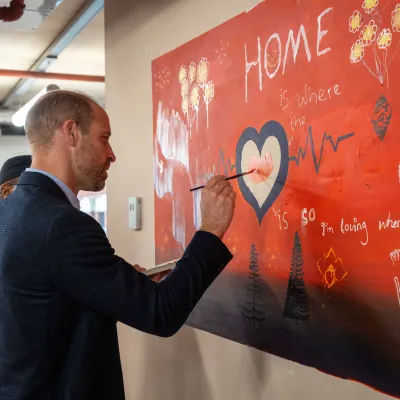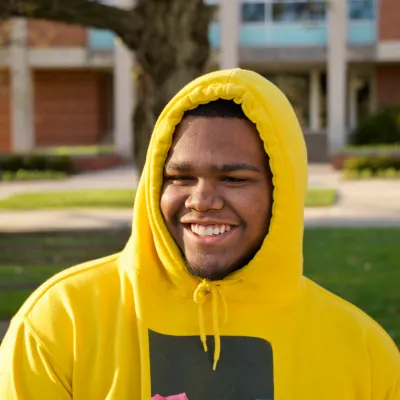Often, young carers will look after a parent or family member to the detriment of their own mental, emotional and physical wellbeing - so much so, in fact, that they are often at significant risk of homelessness. For Young Carers Awareness day, here's what it's like to be a young carer for someone you love - and what we can do to help.
There are an estimated 376,000 young carers between the ages of 16-25 in the UK. This number, however, is likely to be much higher in reality, as so many young people are not recognised as carers ("The young people are not recognised young carers, it’s very unofficial," a Centrepoint practitioner once told us. "Most of our young people have been carers to either parents or their younger siblings").
The definition of young carers is twofold: a young carer is “someone under the age of 18 who helps to look after someone in their family, or a friend, who is ill, disabled or misuses drugs or alcohol"; while young adult carers are classed as being between the ages of 16 and 24, and provide unpaid care for someone on a regular basis. These young carers will cook, clean and shop, help get someone up and dressed, administer medicine, look after siblings and manage budgets.
For many young carers, the everyday pressure they face is immense. Not only are they the primary carer for a parent and/or other members of the family, but it can also be much harder for young carers to stay in education or hold down a job in order to pay the bills. The effect their home life can have on every other aspect of their existence quickly becomes a vicious circle: as Centrepoint explains in its discussion paper, ‘Families Under Pressure’, “instability at home places greater responsibility on young carers, which means many begin to struggle at school and in other aspects of their lives, which in turn places a greater strain on their relationships at home”.
As such, mental health quickly becomes fragile, something which can be greatly exacerbated if there are no networks of support to help. According to our research, one in 10 young people using our services identified a family breakdown as a major cause of their homelessness. For young carers, the huge physical and emotional pressures placed on them at home don’t allow them the same freedoms as their peers, and, as the Learning & Work Institute point out, it’s likely they won’t have the same social networks or resources available to them in order to make a positive move out of the family home.
With this in mind, a change in the law in 2014 meant that the pressure was on for local authorities to allocate more resources for young carers and proactively identify them, rather than waiting for families to come forward and request an assessment. However, young carers are still at a real risk of homelessness.
The law change was supposed to help people like Kai, who until the age of 17 was a carer for his father. His dad suffered with the lung disease COPD, and while Kai and his father weren’t homeless at the time, they were poorly housed, living in temporary accommodation for four years. His dad had been on the council waiting list for a one-bedroom place, but when Kai moved in the process had to be restarted, placing them at the bottom of the list once again.
But for Kai, the problems really started when his father passed away. “There’s not really a way to describe how that felt," Kai said. "It’s indescribable, the grief. Everything I ever knew had been taken away from me. I had to take on all the bills. I didn’t know what to do.”
To make matters worse, Kai was asked to leave this temporary accommodation he had shared with his dad. As a 17-year-old trying to get an education in the midst of this grief and facing homelessness, the pressure became overwhelming, and eventually he dropped out of college: “It was just too much, physically and emotionally. I should have had more support in place, but there just wasn’t any.”
On top of a lack of mental health resources for someone in Kai's position, young carers can also often fall victim to the UK’s housing crisis. The lack of accessible, affordable housing for people who are on low or no income are wholly necessary, and yet are in too short supply. Plus, at a parliamentary roundtable Centrepoint held last year, there seemed to be little evidence that the homelessness reduction act is effectively helping young people: the housing benefit freeze made finding affordable properties in the private rented sector virtually impossible, as does DSS discrimination, and young people face a particular difficulty as they receive lower rates of housing benefit and a lower Universal Credit allowance (although welcome and crucial changes to Universal Credit are expected to come into effect this year). There is an obvious need for housing support for young people and young carers in particular, yet there is little evidence to show that need is being met.
Universal Credit is a particularly tenuous subject for this sector, because it simply does not serve young people in the pragmatic way it should. The benefits system should be easy for young people to understand, yet there are huge complications that can often spark more debt. For Kai, financial issues arose because he wasn’t aware of the repercussions that his employment would have on his benefits. “I didn’t know that I had to declare my work – I assumed that paying tax was declaring it. I hadn’t really worked before so I didn’t really know,” he explained. “I was overpaid on several occasions which I didn’t realise and that racked up to nearly a grand, which I now I have to pay back. Then I’ve got to pay back the advance payments from the ridiculous five-week assessment period. I’m paying £66 per month for over payments. I haven’t got enough money to live on.”
The unpredictable nature of young carers’ lives, combined with financial insecurity and the housing crisis that continuously looms large, means their already strenuous lives are being made far more complicated. For many, as Kai found, there is no possibility of relying on parents, and therefore no buffer between them and poverty.
Here at Centrepoint, our mantra is ‘a job and a home’, and we want to be able to support young carers facing homelessness during such a difficult and crucial part of their lives. After his father’s death, the council wanted to move Kai into a YMCA, but this type of accommodation wasn’t suited to his needs - he needed to be somewhere self-contained. In the end, Kai was given housing through Centrepoint, and he’s been living in a flat with floating support for three years.
And there are other services available to young carers in need of accommodation and support – charity Quaker Social Action’s Move On Up project seeks to provide supported shared housing and support for young carers. It’s this kind of help that allows young people to thrive in their community and secure the friendships they might not have been afforded living at home. So while young carers often can’t see a light at the end of their tunnel, there is support out there that’ll help guide the way until they find it.
If you or someone you know is homeless or at risk, contact the Centrepoint Helpline on 0808 800 0661 (Monday to Friday, 9am-5pm) for free advice and support for 16- to 25-year-olds.
If you are a young carer and would like more information on the Move On Up Project, visit QuakersSocialAction.org.uk






